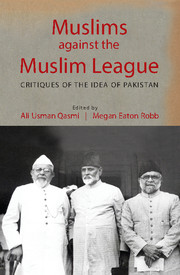Book contents
- Frontmatter
- Contents
- Acknowledgements
- Introduction
- 1 Maulana Husain Ahmad Madani and the Jami'at ‘Ulama-i- Hind: Against Pakistan, against the Muslim League
- 2 The Partition Conundrum: Perspectives, Experiences and Ambiguities from qasbahs in India
- 3 Choudhary Rahmat Ali and his Political Imagination: Pak Plan and the Continent of Dinia
- 4 Differentiating between Pakistan and Napak-istan: Maulana Abul Ala Maududi's Critique of the Muslim League and Muhammad Ali Jinnah
- 5 Advising the Army of Allah: Ashraf Ali Thanawi's Critique of the Muslim League
- 6 The Illusory Promise of Freedom: Mian Iftikhar-ud-Din and the Movement for Pakistan
- 7 Visionary of Another Politics: Inayatullah Khan ‘al-Mashriqi’ and Pakistan
- 8 Nonviolence, Pukhtunwali and Decolonization: Abdul Ghaffar Khan and the Khuda'i Khidmatgar Politics of Friendship
- 9 Islam, Communism and the Search for a Fiction
- 10 Muslim Nationalist or Nationalist Muslim? Allah Bakhsh Soomro and Muslim Politics in 1930s and 1940s Sindh
- 11 Dancing with the Enemy: Sikander Hayat Khan, Jinnah and the Vexed Question of ‘Pakistan’ in a Punjabi Unionist Context
- 12 Religion between Region and Nation: Rezaul Karim, Bengal, and Muslim Politics at the End of Empire
- 13 ‘The Pakistan that is going to be Sunnistan’: Indian Shi'a Responses to the Pakistan Movement
- 14 The Baluch Qaum of Kalat State: Challenging the Ideological and Territorial Boundaries of Pakistan
- Contributors
- Index
13 - ‘The Pakistan that is going to be Sunnistan’: Indian Shi'a Responses to the Pakistan Movement
Published online by Cambridge University Press: 28 February 2018
- Frontmatter
- Contents
- Acknowledgements
- Introduction
- 1 Maulana Husain Ahmad Madani and the Jami'at ‘Ulama-i- Hind: Against Pakistan, against the Muslim League
- 2 The Partition Conundrum: Perspectives, Experiences and Ambiguities from qasbahs in India
- 3 Choudhary Rahmat Ali and his Political Imagination: Pak Plan and the Continent of Dinia
- 4 Differentiating between Pakistan and Napak-istan: Maulana Abul Ala Maududi's Critique of the Muslim League and Muhammad Ali Jinnah
- 5 Advising the Army of Allah: Ashraf Ali Thanawi's Critique of the Muslim League
- 6 The Illusory Promise of Freedom: Mian Iftikhar-ud-Din and the Movement for Pakistan
- 7 Visionary of Another Politics: Inayatullah Khan ‘al-Mashriqi’ and Pakistan
- 8 Nonviolence, Pukhtunwali and Decolonization: Abdul Ghaffar Khan and the Khuda'i Khidmatgar Politics of Friendship
- 9 Islam, Communism and the Search for a Fiction
- 10 Muslim Nationalist or Nationalist Muslim? Allah Bakhsh Soomro and Muslim Politics in 1930s and 1940s Sindh
- 11 Dancing with the Enemy: Sikander Hayat Khan, Jinnah and the Vexed Question of ‘Pakistan’ in a Punjabi Unionist Context
- 12 Religion between Region and Nation: Rezaul Karim, Bengal, and Muslim Politics at the End of Empire
- 13 ‘The Pakistan that is going to be Sunnistan’: Indian Shi'a Responses to the Pakistan Movement
- 14 The Baluch Qaum of Kalat State: Challenging the Ideological and Territorial Boundaries of Pakistan
- Contributors
- Index
Summary
The All India Muslim League is a body dominated by the Sunni Mussalmans… the League is a fascist body out to crush all opposition and capture power to establish the government of a Sunni Junta, by a Sunni Junta and for a Sunni Junta… Shias [see] in it the total annihilation of their faith, their culture and their individuality.
Hosseinbhoy Laljee, an Isna ‘Ashari Shi'a from a trading family of Bombay and an established politician with a career on the Bombay Legislative Council, was not inclined to temper his language. As current president of the Shi'a Political Conference, a political organization that claimed widespread Indian Shi'a support, he was engaged in a furious campaign to ensure that what he called the ‘Shi'a Muslims’ case’ was heard in the tumult of negotiations in the mid-1940s surrounding independence and the likely creation of Pakistan. Petitioning India's major political parties and British overlords, Laljee frequently invoked the perils that awaited the Indian Shi'a should their distinctive needs not be recognized within any political settlement. Pakistan, he argued in various correspondence, would fall under Sunni shari'a law and would fail to offer its Shi'a citizens either freedom of worship or protection from discrimination. In another telegram, he suggested with arguably some element of prescience that Shi'as ‘should not… hope that their religious rights [will] be safe in Pakistan, which is going to be Sunnistan.’
Laljee's rhetoric hints at the existence of a deep apprehension about the creation of Pakistan across a spectrum of Indian Shi'a opinion, which has often been somewhat disregarded in a body of scholarship on the Pakistan movement that has more frequently emphasized the building of a coherent Muslim qaumiyyat (‘national identity’) in the face of Hindu domination. Within this dominant historiographical trajectory, Shi'a-Sunni political debates in pre-partition India have often been dismissed as either marginal or irrelevant; as M. Q. Zaman puts it, ‘issues of sectarian significance were not prominent in the course of the Pakistan movement.’ It has equally been assumed that Shi'a and Sunni responses to, and experiences of, the Pakistan movement were roughly comparable. For instance, as expressed by Mushirul Hasan, Shi'as uncomplicatedly ‘hitched their fortunes with the League bandwagon’ before partition; ultimately, he claims, in spite of minor quarrels, ‘the forces of an overriding and hegemonic “Muslim nationalism” subsumed sectarian allegiances. Shias and Sunnis undertook their long trek towards the promised dar-al-Islam.’
- Type
- Chapter
- Information
- Muslims against the Muslim LeagueCritiques of the Idea of Pakistan, pp. 350 - 380Publisher: Cambridge University PressPrint publication year: 2017
- 2
- Cited by



